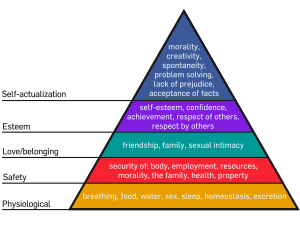 Image via Wikipedia
Image via WikipediaAbraham Maslow, one of the founding fathers of humanist approached to management, gave us much insight into the needs and motivation of people. Maslow theorized that human behavior is directed toward the fulfillment of several levels of needs that all people have in common. It is crucial to understand that while we strive to satisfy these needs, we must understand that different levels of needs will motivate us at different times. Directing your actions towards the gratification of the particular need of the moment will have the most meaning in terms of motivation.
Level One: Physiological Needs – These needs are hunger, thirst, fatigue, air and shelter. These are basic needs that must be met. People will go to any means to satisfy them. When satisfied, we are free to move to the next level.
Level Two: Safety Needs – these needs obviously relate to safety, security, protection and freedom from fear. Included here is the need to have order, laws and structure so a person can feel protected. In the modern world these needs are often represented by things such as regular income, financial stability and proper insurance. Examples in a workplace include safety needs such as equal treatment, fairness, honesty, due process or the right to be heard and arbitrary and unfair use of authority. OSHA laws and the American Disabilities Act are examples of how we try to fill these needs in an external manner. Once the safety needs are reasonably met we are free to go to the next level.
Level Three: Love and Belonging Needs – Social acceptance and love needs are strong desires with great motivating power for virtually everyone. This need to belong, to feel others around you that share your ideas and value you as a person, is a need that leads us to join a variety of social organizations, the most basic of which is a family. Love needs extend beyond romantic love and parent- child love. Love extends to the need for affiliation, to form friendships, to love and be loved, to join groups and to generally be well liked and accepted by others. Social acceptance is often an outward indication of the needs for self-acceptance. Being accepted by others offers us assurance that we are worthwhile.
Level Four: Self Esteem – Maslow actually acknowledged two levels of esteem needs. The first or lower level of esteem is focused on respect for others, the need for status, recognition, fame, prestige and attention. The second level of esteem or higher level esteem is the need for self-esteem, personal strength, competence, personal mastery, self-confidence, independence and freedom. It is important to note that according to Maslow only when levels one through four needs are satisfied can level five needs be addressed.
Level Five: Self Actualization – Maslow refers to this level as growth motivation. When a person is in need of one of the other four levels it is typically due to a deficit. Your body will tell you when you are hungry or thirsty. When we are afraid we will dwell on finding a solution or necessary protection. Self- actualization and self-fulfillment refer to the process of making maximum use of our abilities and talents.
Part 2 will talk about motivation in the workplace as it relates to the Five Levels. Please feel free to visit my website or contact me directly at 847/541-5299. To your success…

No comments:
Post a Comment